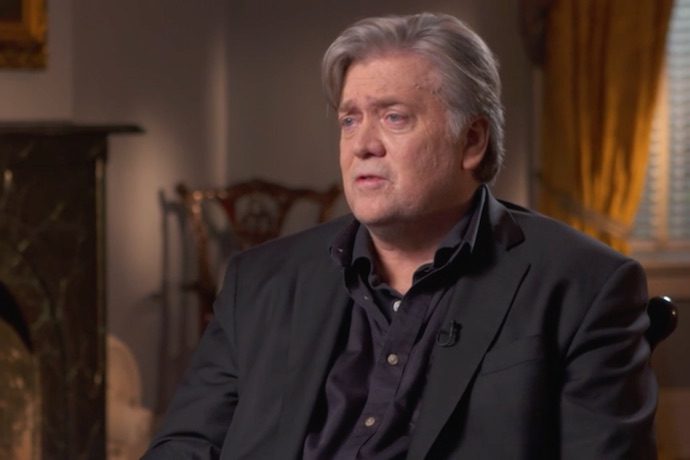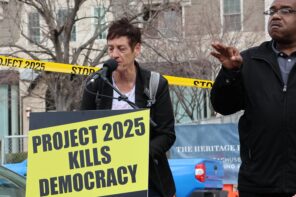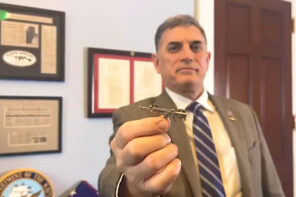The phrase “cafeteria Catholic” first gained currency in the mid-1980s to describe—mostly disparagingly—progressive Catholics who pick and choose from church doctrine, following the precepts they like on poverty and peace while ignoring those they didn’t like on sex—particularly regarding birth control and abortion, homosexuality and divorce.
Ever since then, there’s been no more damning invective that conservative Catholics could throw at their progressive brethren, suggesting that the only “good Catholics” are those who accept the full suite of church teaching. But Steve Bannon’s much discussed interview with Charlie Rose revealed the true extent to which many conservative Catholics have jettisoned core church teaching in favor of a distinctly Republican cafeteria Catholicism.
Ross described Bannon as a “good Catholic” when he reminded him “that Cardinal Dolan is opposed to what’s happened with DACA” after Donald Trump announced he would end the program protecting the children of undocumented immigrants.
Bannon’s answer, after slamming the bishops for using “illegal aliens to fill the churches,” was a masterpiece of the type of pick-and-choose Catholicism that conservatives usually decry:
As much as I respect Cardinal Dolan and the bishops on doctrine, this is not doctrine. This is not doctrine at all. I totally respect the pope and I totally respect the Catholic bishops and cardinals on doctrine. This is not about doctrine. This is about the sovereignty of a nation. And in that regard, they’re just another guy with an opinion.
But as numerous people have pointed out, welcoming immigrants is most certainly Catholic teaching, i.e., doctrine. As James Rogers, the head of communications for the U.S. Conference of Catholic Bishops noted:
It is preposterous to claim that justice for immigrants isn’t central to Catholic teaching. It comes directly from Jesus Himself in Matthew 25, ‘For I was hungry and you gave me food…a stranger and you welcomed me.’ Immigrants and refugees are precisely the strangers we must welcome. This isn’t Catholic partisanship. The Bible is clear: welcoming immigrants is indispensable to our faith.
Hostility toward immigrants isn’t the only area where Bannon’s Catholicism is suspect, although according to Joshua Green, the author of Devil’s Bargain, the new book about Bannon and Trump, Bannon grew up in an observant Catholic family and, despite some dalliances with world religions like Buddhism, considers himself a practicing Catholic.
As America magazine’s Michael O’Loughlin notes in a Washington Post profile of Bannon’s somewhat opaque relationship with Catholicism, while Bannon proclaims that both the Catholic Church and the West are suffering from a crisis of faith and morality, he has been divorced three times and to the best of many of his associates’ knowledge doesn’t attend church—pretty much the definition of a practicing Catholic.
The conservative Catholic provocateur Austin Ruse, who has used his organization C-FAM to embed a conservative Catholic presence at the UN, described him to O’Loughlin as a “nonpracticing orthodox Catholic,” or “somebody who for whatever reason is not practicing the faith but who does not dissent from any of its teachings.” To Ruse this is obviously totally different from practicing progressives who faithfully go to mass but dare dissent from church teaching on abortion or homosexuality, which means their voice in the church isn’t legitimate.
Ruse, like Bannon, makes a distinction between what he considers “doctrine”—the church’s conservative teaching on sex, which largely concerns individual actions—and what he considers non-doctrinal issues of social teaching on immigration, poverty and war—which touch on the individual’s role in the larger society. The church, however, makes no such distinction. It considers doctrine all teachings regarding faith and morals.
It was exactly this false distinction that Pope Francis was attempting to erase last week when he said that ending DACA wasn’t “pro-life”:
The President of the United States presents himself as pro-life and if he is a good pro-lifer, he understands that family is the cradle of life and its unity must be protected.
What Bannon does really, really believe in, apparently, besides the general patriarchy of Catholicism and the importance of the “traditional” family, is the Catholic idea of subsidiarity—that issues are best dealt with at the most local level practicable rather than by a central authority. This offers a convenient justification for Republican attacks on “big government” and reasonable levels of taxation that support federal anti-poverty programs, which the Catholic hierarchy generally supports.
As O’Loughlin notes, this is very much in line with Breitbart’s coverage of the church under Bannon, which was “aimed at bolstering conservative ideas and undercutting progressive figures.”
And this explains much of the conservative Catholic movement over the past twenty years, from Bannon to Paul Ryan, who recently told a Catholic nun (who questioned his commitment to the Catholic teaching of the preferential option for the poor because he wanted to decimate the ACA) that he was following Catholic teaching by cutting taxes and getting rid of social programs:
We exercise prudential judgment in practicing our faith. For me—for the poor that’s key to the Catholic faith. That means mobility, economic growth, equality of opportunity.
I think we need to change our approach on fighting poverty. Instead of measuring success on how much money we spend or how many programs we create or how many people on those programs, let’s measure success and poverty on outcomes.
Except that as far as outcomes go, none of the Republican’s various tax-cutting or welfare-reduction schemes have been shown to reduce poverty or create upward mobility. They aren’t a means to an end; they are an end in themselves.
So apparently Paul Ryan goes to the same cafeteria as Steve Bannon, where large helpings of words like subsidiarity and prudential judgment allow them to ignore Catholic teaching, just as sure as someone who sits in mass every week but uses the Pill. But in their case, it’s not a matter of an individual “sin” that carries little social consequence but of consequential actions that harm whole societies.





